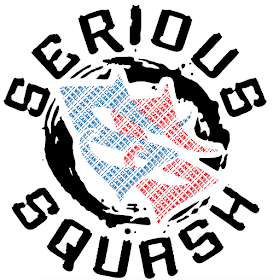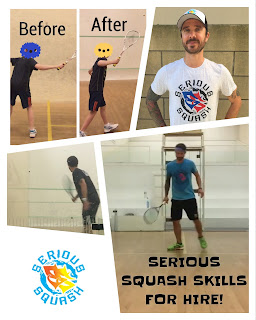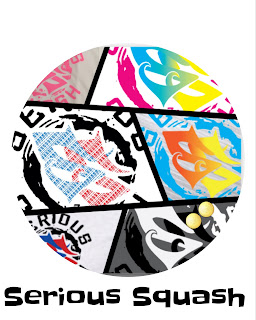The 4 wall glass how court and large tv screen showing all the action on the surrounding courts
Under 17 winner from Mexico sliding into a shot
A big draw for the US Junior Open is the opportunity to get noticed by some varsity squash coaches taking in the action. As great as an opportunity it is to play in front of college coaches it also brings a new level of pressure onto the outcome and performance of the kids, especially those in grade 11. But is this pressure a bad thing? If a kid makes it onto a college team and their match is the deciding match that comes with a lot of pressure as well. In the end I think it's an important lesson for the kids to learn how to just go out and play and keep their focus on what they can control. In the end it's still squash and that's what they've been doing almost every day for many years now.
Trinity cohosted the US Junior Open on the first 2 days of the event
I can't write a post about the US Junior Open without discussing the amazing venues. If anyone hasn't been to Yale before the squash facility is just as impressive as the rest of the campus. They have 16 courts, 3 of them show courts and all have permanent video cameras and electronic scoreboards. But when you have a tournament of 99+ kids 16 courts is not enough. They used 4 venues in total for this event. Trinity College has older courts, but is impressive in their own rights. Trinity has about 9 or 10 courts. Trinity is normally about an hour commute although when I went it was through a big snowstorm and took about 2 hours on the tournament shuttle school bus. Most times I took a shuttle the bus driver had no idea where the squash courts were and there were no signs posted at the alternate venues directing us. Something that can and should be addressed in future years.
Old Squash Team Photo at Wesleyan
Bill Belichick not only went to Wesleyan but also played on their squash team!
A short clip of the 2 show courts at Trinity
A sign posted on a door at Trinity
Wouldn't it be nice to have 10 courts at your high school? Choate does
The under 17 winner hitting a crosscourt nick off of a loose serve
Haven't seen this 1 before (at Yale)
I think many people (including some coaches) forget that even though this is the US Junior Open it is a learning experience and not a professional tournament. Try your best, leave it all on the court, have fun and learn your experience At the older ages you can tell the difference between the kids who have trained for many years because squash is their passion and those that have external pressures on them to go further. If the passion and enjoyment isn't there eventually the wick will burn out. This is why I always focus on the process of performance rather than results. I already know we all want to win, we're out there competing and the best way to have the most success long term is to constantly learn and try and improve all areas of your game. I know most people will compensate this philosophy to win and they will pay for it long term. Play your game, play the right shot and enjoy the challenge; may the best boy or girl win. And if you're not the best you will learn what you need to work on so remember there are extremely valuable lessons to be learnt from your loses.
I'm having a holiday deal at SeriousSquashShop.com For the remainder of 2016 enter the code HOLIDAY30 and receive 30% off your order!























